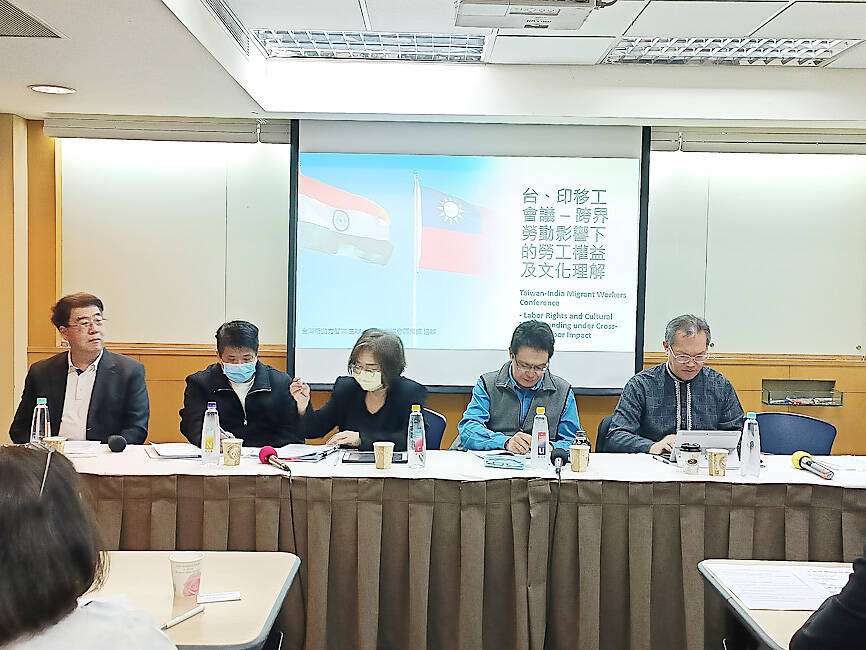[[“value”:”
MIGRANT WORKERS:
A Ministry of Labor official said that the ministry would recruit Indian workers according to India’s regional development and Taiwan’s particular needs
By Liu Tzu-hsuan / Staff reporter, Additional reporting by CNA
Taiwan is to take gradual steps toward introducing migrant workers from India, such as holding working-level meetings and conducting trial runs, a Ministry of Labor official said yesterday.
Taiwan and India signed a memorandum of understanding (MOU) on migrant workers last month, sparking concerns that introducing Indian migrant workers might decrease work opportunities for Taiwanese and cause social problems.
The ministry has been soliciting opinions from all sectors regarding the MOU, including consulting Indian professionals and specialists as well as Taiwanese businesspeople based in India at a meeting earlier this month, Hu Hsin-yeh (胡欣野), a senior official from the ministry’s Workforce Development Agency, told a news conference in Taipei.
Photo: Lee Ching-hui, Taipei Times
The ministry plans to consult with representatives of Indian migrant workers and other interest groups to obtain their insights on the issue in future meetings, she said.
The specializations of Indian workers vary from region to region, so it would recruit talent in fields according to the country’s regional development and Taiwan’s needs, she said.
The MOU stipulates that Taipei would specify how many migrant workers are needed for what industries, while New Delhi would handle recruitment and training, the ministry said previously.
The ministry is also to organize working-level meetings with Indian counterparts to discuss implementation details, but the meetings have not been scheduled, she said.
India is only to be officially announced as a new source country for migrant workers after all the preparation is in place, she said.
Only a limited number of Indian migrant workers would be recruited as test runs of the new policy, the effectiveness and results of which would determine further actions, she said.
In response to concerns that the MOU would reduce job opportunities for Taiwanese, Hu said that hiring should always prioritize citizens according to the Employment Service Act (就業服務法).
The MOU offers an additional option for employers to choose from, as well as Indonesia, Vietnam, Thailand and the Philippines, she said, adding that employers and employees would have to pass a review.
Also, all migrant workers would have to provide proof of not having a criminal record before they are hired to work in Taiwan, she said.
Statistically, the crime rate for migrant workers in Taiwan is only about half the national average, Hu said.
Lennon Wong (汪英達), director of a service center and shelter for migrant workers run by the Serve the People Association in Taoyuan, warned about the lack of preparedness in Taiwan’s employment environment for Indian migrant workers.
There are few interpreters who speak the languages of migrant workers, which means that the rights of migrant workers might not be properly protected, he said.
He also called on the government to bring in clear regulations to ensure fair employment of migrant workers.
Taiwan should begin measures to help foster understanding between Taiwanese and Indians, and facilitate bilateral interactions before the MOU goes into practice, such as training interpreters and planning the reinstatement of direct flights between Taiwan and India, National Tsing Hua University Center for India Studies deputy director Fang Tien-sze (方天賜) said.
Speaking during the same seminar, Debjani Ghosh, president of the India-based National Association of Software and Services Companies, said Taiwan is world-renowned for its “supremacy” in semiconductor development.
However, like most countries around the world, Taiwan is also facing growing talent shortages, including 22,000 unfulfilled engineer positions.
India, on the other hand, is the only country projected to have a surplus of 1 million skilled professionals in technology by 2030, she said.
India also has about 37 million graduates, 11 million of whom studied science, technology, engineering and math, Ghosh said.
With its robust and diverse talent pool and great working ethics, India has much to offer Taiwan, particularly in addressing its talent shortage, she added.
Comments will be moderated. Keep comments relevant to the article. Remarks containing abusive and obscene language, personal attacks of any kind or promotion will be removed and the user banned. Final decision will be at the discretion of the Taipei Times.
“]]



